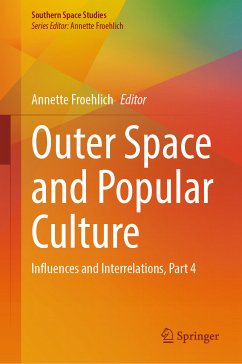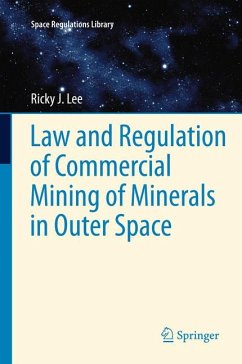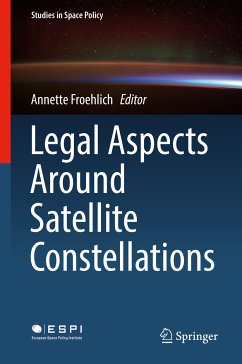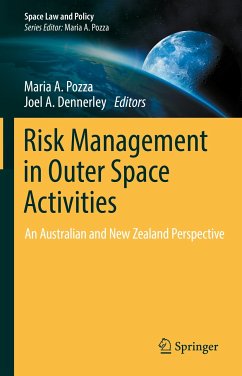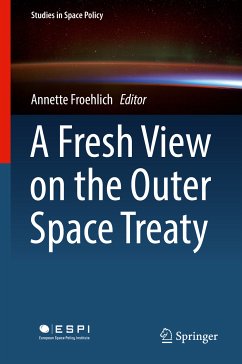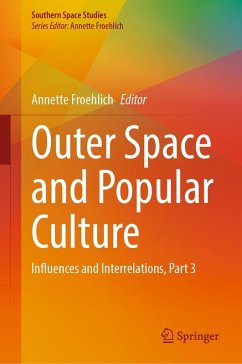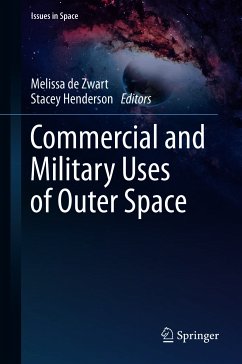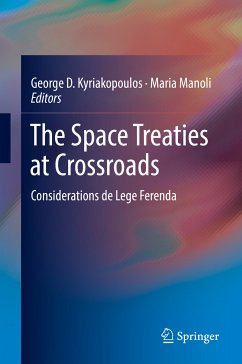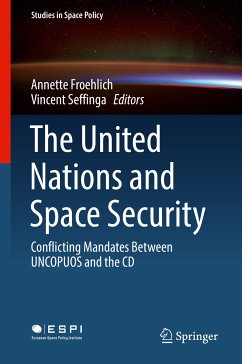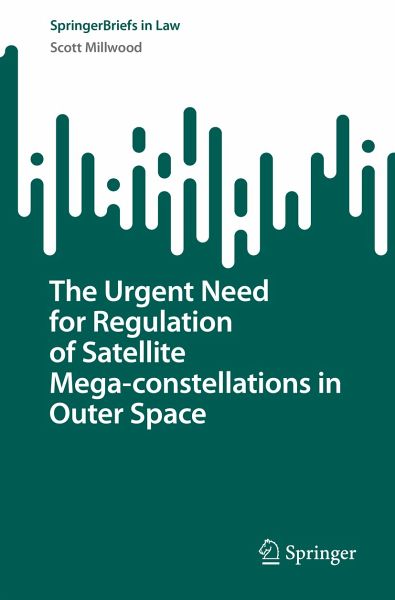
The Urgent Need for Regulation of Satellite Mega-constellations in Outer Space (eBook, PDF)
Versandkostenfrei!
Sofort per Download lieferbar
40,95 €
inkl. MwSt.
Weitere Ausgaben:

PAYBACK Punkte
20 °P sammeln!
This book calls for the urgent regulation of satellite mega-constellations in outer space, proposing a new model of "international regulatory coordination", in order to ensure the sustainable balance of science and advanced telecommunications. We are currently witnessing expansion of the Internet off our planet. The proliferation of new space-based internet connectivity has been accompanied by much discussion about the potential impact on astronomy. Scientists are increasingly concerned that mega-constellations proposed by SpaceX, OneWeb, Amazon and Facebook, might wreak havoc on scientific re...
This book calls for the urgent regulation of satellite mega-constellations in outer space, proposing a new model of "international regulatory coordination", in order to ensure the sustainable balance of science and advanced telecommunications. We are currently witnessing expansion of the Internet off our planet. The proliferation of new space-based internet connectivity has been accompanied by much discussion about the potential impact on astronomy. Scientists are increasingly concerned that mega-constellations proposed by SpaceX, OneWeb, Amazon and Facebook, might wreak havoc on scientific research and transform our view of the stars. These commercial operators plan to launch hundreds of thousands of satellites into Low-Earth Orbit (LEO) in the coming decade, representing a 1000% increase on objects currently in orbit. This book examines this new space race in the context of historical rivalries, for it is clear that mega-constellations are being actively pursued by a US administration determined to dominate LEO as tensions with China rise. This creates a risk of interference with earth-based scientific activities that use optical and radio frequency techniques to study the universe. This book examines these developments in the context of the Outer Space Treaty (OST), which provides all States with the freedom of scientific investigation, exploration and use of outer space, while balancing this with obligations to avoid interference with the space activities of other States. It draws upon interviews with some of Europe's leading astronomers in order to highlight the extent to which the issue will require legal and regulatory reform of mega-constellation licensing processes, to ensure the integrity of astronomical science is preserved. The race to dominate LEO also comes at a time when the monopolistic power of Facebook, Amazon and other TechGiants, is under renewed scrutiny in western democracies. The author argues that a new governance framework for launch and operational licenses is urgently required, in which impact risk assessments, scale and proportionality, and stakeholder consultation processes should play important roles. It is now vital that the astronomical community - whose skill-set does not generally involve leading regulatory strategies - engage with those who can support its leadership in exerting a renewed influence. The diplomacy of science, which played a vital role during the Cold War and the establishment of global commons, must be reinvigorated for the New Space era.. It is now vital that the astronomical community - whose skill-set does not generally involve leading regulatory strategies - engage with those who can support its leadership in exerting a renewed influence. The diplomacy of science, which played a vital role during the Cold War and the establishment of global commons, must be reinvigorated for the New Space era.. It is now vital that the astronomical community - whose skill-set does not generally involve leading regulatory strategies - engage with those who can support its leadership in exerting a renewed influence. The diplomacy of science, which played a vital role during the Cold War and the establishment of global commons, must be reinvigorated for the New Space era.. It is now vital that the astronomical community - whose skill-set does not generally involve leading regulatory strategies - engage with those who can support its leadership in exerting a renewed influence. The diplomacy of science, which played a vital role during the Cold War and the establishment of global commons, must be reinvigorated for the New Space era.. It is now vital that the astronomical community - whose skill-set does not generally involve leading regulatory strategies - engage with those who can support its leadership in exerting a renewed influence. The diplomacy of science, which played a vital role during the Cold War and the establishment of global commons, must bereinvigorated for the New Space era.. It is now vital that the astronomical community - whose skill-set does not generally involve leading regulatory strategies - engage with those who can support its leadership in exerting a renewed influence. The diplomacy of science, which played a vital role during the Cold War and the establishment of global commons, must be reinvigorated for the New Space era.. It is now vital that the astronomical community - whose skill-set does not generally involve leading regulatory strategies - engage with those who can support its leadership in exerting a renewed influence. The diplomacy of science, which played a vital role during the Cold War and the establishment of global commons, must be reinvigorated for the New Space era.. It is now vital that the astronomical community - whose skill-set does not generally involve leading regulatory strategies - engage with those who can support its leadership in exerting a renewed influence. The diplomacy of science, which played a vital role during the Cold War and the establishment of global commons, must be reinvigorated for the New Space era.. It is now vital that the astronomical community - whose skill-set does not generally involve leading regulatory strategies - engage with those who can support its leadership in exerting a renewed influence. The diplomacy of science, which played a vital role during the Cold War and the establishment of global commons, must be reinvigorated for the New Space era.. It is now vital that the astronomical community - whose skill-set does not generally involve leading regulatory strategies - engage with those who can support its leadership in exerting a renewed influence. The diplomacy of science, which played a vital role during the Cold War and the establishment of global commons, must be reinvigorated for the New Space era.
Dieser Download kann aus rechtlichen Gründen nur mit Rechnungsadresse in A, B, BG, CY, CZ, D, DK, EW, E, FIN, F, GR, HR, H, IRL, I, LT, L, LR, M, NL, PL, P, R, S, SLO, SK ausgeliefert werden.



